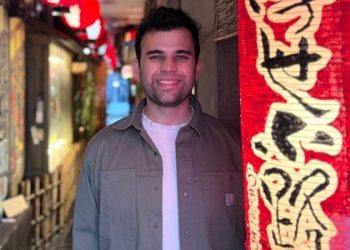- When Kevin Tien’s restaurant abruptly closed, he took steps to reopen it on his own terms.
- All the unexpected costs of running a restaurant add up, so he gets everything he can out of his investment.
- He says it’s important for AAPI entrepreneurs to look for local advocates who can help on the journey.
Chef Kevin Tien opened his first restaurant, Himitsu, in 2018. It quickly became a local favorite within the Washington, DC, food scene with its spicy fried chicken and colorful crudos infused with Vietnamese flavors like lemongrass and garlic. As a son of Vietnamese immigrants raised in Louisiana, he brought Southern and Southeast Asian flavors to his restaurants, garnering awards and a cult following across the Washington, DC, metro area.
He subsequently worked as an executive chef for several other restaurants. His restaurant Moon Rabbit abruptly closed in 2023 when its landlord decided not to unionize, something the hospitality staff was pushing for.
Tien opened Moon Rabbit again in the Penn Quarter neighborhood a year later — this time, as the chef/owner of the restaurant. The road to opening has come with challenges, and Tien has learned a great deal in preparing himself financially to open his restaurant under his terms.
Have your finances in order before you start
Tien recommends having at least three months of working capital saved to offset unexpected expenses. As he got ready to open Moon Rabbit, he sold his home, used the sales profit, and withdrew from his wife’s 401(k) to raise money to open his restaurant.
He knew he had to be more frugal to open his restaurant. “We also started limiting our expenses at home. As a chef, I like to go out to eat on my days off, but I realized that I had to buckle down and eat more at home so we could save money along with consolidating our bills. Overall, we’re around $1,500 a month,” says Tien.
He advises against borrowing from friends or family, noting that such decisions can complicate personal relationships. Tien highlights the unforeseen costs that can impact a business, emphasizing that it is often not the major expenses like rent or labor but the myriad of smaller, unanticipated costs that add up.
Additionally, he stresses the necessity of being fully aware of all tax liabilities, including payroll and sales taxes, to avoid future financial complications. In his case, he sets aside his monthly taxes and places them in a savings account to ensure the funds are there when it’s time to pay.
Prioritize your business spending
Tien emphasizes the importance of having adequate financial preparation before starting a business.
“We used our savings and everything we had to open Moon Rabbit. And one of the most important things was getting equipment and supplies as we made revenue. We opened on a slim budget,” says Tien.
He stresses focusing on the essentials as you grow your business. “Things don’t always go well, so keeping an eye on the numbers is crucial. Because we are very personally invested financially, we grow the space as we generate revenue. Many people want to get everything they can right from the beginning, but that’s always very expensive. We focused on getting what we needed to provide a very nice service,” explains Tien.
Tien also recommends using a business credit card, which allows you to accrue points with purchases.
“I have a Chase business credit card,” Tien says, “which gives me 3 points per grocery purchase, and our restaurant ingredients are considered grocery expenses. I turn around and use those points to buy other items, like paper goods.”
Managing money and preparing for the future
“I used to be bad at saving money,” Tien recalls as he looks back at his financial outlook. “Operating a restaurant can be difficult as margins are small, but I make sure to save every week, no matter how small the amount is. Sometimes, I only saved $20 in a week. Once I build enough, I move it to a CD account to accrue a higher interest rate.”
He also has a side hustle consulting for other restaurants. As he provides similar consulting services for Moon Rabbit, he bills the restaurant his fee instead of taking a salary to keep his accounts separate.
Insurance is another essential expense for Tien. He purchases life insurance and personal injury insurance to protect himself financially in case of an accident. To get the best life insurance deal, he advises going with an insurance broker who can offer a bundle deal with multiple policies. “In our case, the same company that provides our workers’ comp insurance also manages my life insurance policy.”
Choose your partners wisely
Tien says it’s important to choose the right partners in business, highlighting the value of long-standing relationships and mutual support. “For me, it’s about finding the right people to be partners with. Many of our co-chefs and co-owners, like Judy Beltrano, Susan Bae, and Alan Vo, have worked with me since I was a kid at Momofuku. We have a relationship spanning over 10 years, where we understand each other intuitively,” says Tien.
He explains that these colleagues supported him through the best and worst times, so he chose them as partners. “When things were at their lowest, they stuck with me and helped find solutions to create a business we are proud of,” Tien adds.
Look for community resources
Tien contacted his friends in the tight-knit Washington, DC, restaurant industry to learn best practices in opening Moon Rabbit. “I have a lot of really great friends in the industry who helped walk me through the permitting and application process. I think this is the best way to do it,” says Tien.
He stresses the importance of preemptively going through the steps of permitting and application before signing a lease, which helps expedite the overall process and save money by operating as soon as possible.
For AAPI entrepreneurs looking to lay their financial groundwork for starting a business, Tien suggests leaning into your local community. “Lean on organizations serving the AAPI and restaurant advocacy organizations for guidance. There are people in your local government are there to help and provide resources,” he says.
Tien mentions the Washington, DC, Mayor’s Office of Asian Affairs and the Restaurant Association Metropolitan Washington as significant resources that supported his entrepreneurial journey.










